Jul 2010
Jul 2010 sadmin'Rise Mzanzi' highlights economic opportunities
'Rise Mzanzi' highlights economic opportunities sadmin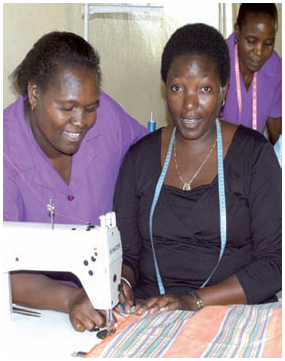 To highlight the economic opportunities in the inclusive economy (previously known as the second economy or informal business sector), government started an awareness campaign in the form of a reality TV show. The programme, called Rize Mzansi, started on Tuesday 13 July and will run until 5 October. The 13-episode show can be seen on SABC1 between 6:30 and 7:30 on Tuesday evenings. It aims to educate entrepreneurs on how to run a small business. Through Rize Mzansi government is encouraging all South Africans to take advantage of existing economic opportunities created by government. These will go a long way to fight poverty. Key issues to feature on include how to write a business plan, finding finance for small businesses and registration of a business. It will also address tourism enterprise support schemes, co-operative incentive schemes, agricultural economic opportunities, support schemes to grow small business, women and youth economic opportunities and environmental economic opportunities.
To highlight the economic opportunities in the inclusive economy (previously known as the second economy or informal business sector), government started an awareness campaign in the form of a reality TV show. The programme, called Rize Mzansi, started on Tuesday 13 July and will run until 5 October. The 13-episode show can be seen on SABC1 between 6:30 and 7:30 on Tuesday evenings. It aims to educate entrepreneurs on how to run a small business. Through Rize Mzansi government is encouraging all South Africans to take advantage of existing economic opportunities created by government. These will go a long way to fight poverty. Key issues to feature on include how to write a business plan, finding finance for small businesses and registration of a business. It will also address tourism enterprise support schemes, co-operative incentive schemes, agricultural economic opportunities, support schemes to grow small business, women and youth economic opportunities and environmental economic opportunities.
2010 WORLD CUP IN PICTURES A COLOURFUL FOOTBALL FEAST
2010 WORLD CUP IN PICTURES A COLOURFUL FOOTBALL FEAST sadminThe 2010 Football World Cup will be remembered as the most colourful World Cup ever. South African soccer fans are said to be among the most brightly dressed in the world, leaving lasting impressions on millions of television screens. At every match, a sea of excited fans in lively gear, makarapas, vuvuzelas, happy smiles, songs and dance brightened up the stands. Here are just some images that caught our eye...
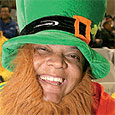 |
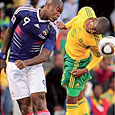 |
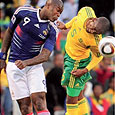 |
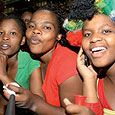 |
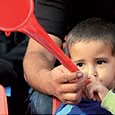 |
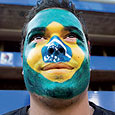 |
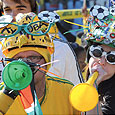 |
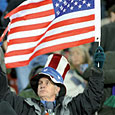 |
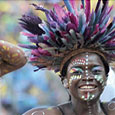 |
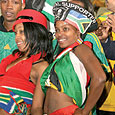 |
2010 WORLD CUP LEGACY A LASTING LEGACY BEYOND 2010
2010 WORLD CUP LEGACY A LASTING LEGACY BEYOND 2010 sadmin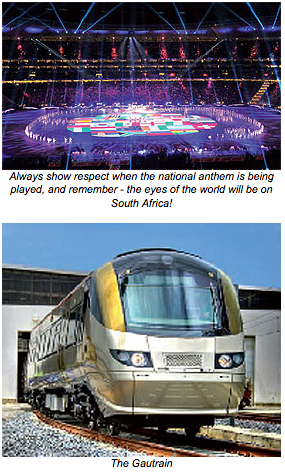 For millions of people around the world, the FIFA Football World Cup is a festival of football matches. However, for millions of South Africans, this football festival will always be remembered as the change agent that united the people and brought many benefits to the country beyond 2010.
For millions of people around the world, the FIFA Football World Cup is a festival of football matches. However, for millions of South Africans, this football festival will always be remembered as the change agent that united the people and brought many benefits to the country beyond 2010.
The successful hosting of the 2010 FIFA World Cup has not only put South Africa on the world map, but has left some major legacies for the South African people. Among them are upgraded public transport systems, more resources to fight crime, football development, world-class sports facilities and improved technology.
Tourism
Hosting the World Cup has boosted South Africa as a destination of choice for tourists. But it is not only tourism in our own country that will benefit from the legacy of a memorable and successful World Cup; it will also attract tourists to the member countries of the Southern African Development Community (SADC) and the African continent as a whole.
Sports facilities
The World Cup has left South Africa with world-class sports facilities. This does not only include the official match stadiums, but related training stadiums, venues, camps and base camps. All of this will now be in place and ready for almost any sporting event that may come our way.
Infrastructure
Government spent more than R33 billion on upgrading the road infrastructure in major cities ahead of the World Cup. Development of key infrastructure for the country will attract local and foreign investment, which in turn, will help create jobs and develop skills.
Upgraded roads will also ease the heavy traffic in our cities. For example, more lanes have been added to the busy R21 and R24 Albertina Sisulu highways between OR Tambo International Airport and the Metropolitan City of Tshwane. Major roads in other provinces have also been improved.
Gautrain
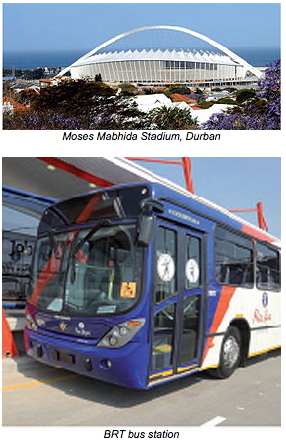 In addition, the construction of the Gautrain - Africa's first rapid rail link intercity train service - was speeded up ahead of time for the World Cup.
In addition, the construction of the Gautrain - Africa's first rapid rail link intercity train service - was speeded up ahead of time for the World Cup.
Just a few days before the kickoff on 11 June, the Gautrain started transporting passengers between Sandton and the OR Tambo International Airport.
When the other rapid rail link routes are completed next year, the service will also operate between the Ekurhuleni and Tshwane metropolitan areas.
The rapid rail service will furthermore improve traffic on Gauteng's highways, as there will be fewer vehicles during peak traffic periods.
Bus Rapid Transit
In other major cities, mass-passenger Bus Rapid Transit (BRT) or Integrated Rapid Transit (IRT) systems have been started to change and improve public transport.
About 85 per cent of the people living in major cities in South Africa, including Johannesburg, Tshwane, Cape Town, Durban and Port Elizabeth will now be living within a kilometre or closer to a BRT transport system.
This will have a positive effect on the lives of workers and those who do not have cars. They will now have a reliable, safe and secure public transport service.
Airports
The country's airports have been upgraded and improved in the run-up to the World Cup, with Durban boasting a brand new international airport. This will ensure that we have some of the most modern and up-to-date air travel terminals in the world, and the continent in particular, for years to come.
Security
More than R2 billion was spent on FIFA World Cup security, which was developed to FIFA's high standards. It will be a lasting legacy in the fight against crime, which is one of government's key priorities.
An additional 41 000 police officers had been specially appointed for the tournament. They have gained valuable skills and will now join other officers in fighting crime throughout the country.
In addition, the South African Police Force also got modern new equipment to help them fight crime. These include helicopters, vehicles, crowd-control equipment and modern bomb-detection and bomb-disposal equipment.
Working with the Department of Home Affairs' Immigration Branch, the police now also have a modern immigration and passport-control system that can be used to find wanted suspects at ports of entry around the country. This equipment was successfully used to stop football hooligans from entering during the World Cup at different entry points.
Football development
Football development at grassroots level has benefited a great deal from the World Cup. As part of grassroots football development, more than nine new football fields have been built in South Africa.
A further 44 fields have also been built in other African countries. The nine completed football fields in South Africa form part of the 52 fields that have been planned for the country as part of the 2010 World Cup legacy projects. The building of new football fields with artificial grass in rural areas is an ongoing project.
Olympics
All these developments will help South Africa when it bids to host other major world events. The country has already successfully hosted the football, rugby, and cricket world cups. Africa's time has come to host the Olympic Games.
- Mbulelo Baloyi
This World Cup has shown that the continent of Africa is ready to host any other major world event.
2010 WORLD CUP LEGACY AN OUTSTANDING SUCCESS
2010 WORLD CUP LEGACY AN OUTSTANDING SUCCESS sadmin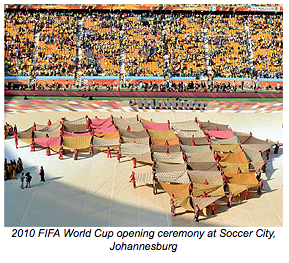 Hosting the FIFA World Cup gave South Africa a world stage and an opportunity to experience the reality that we belong to one human family, regardless of race, colour, gender, age, political and religious belief, and country or continent of origin.
Hosting the FIFA World Cup gave South Africa a world stage and an opportunity to experience the reality that we belong to one human family, regardless of race, colour, gender, age, political and religious belief, and country or continent of origin.
It was an outstanding success, said 2010 Organising Committee CEO, Danny Jordaan after the final match. "The stadium looked beautiful - I don't think I have seen a stadium look like that anywhere in the world. I am sure that the millions watching throughout the globe were hugely impressed with what has happened here tonight."
Rebirth
On the day FIFA President Sepp Blatter announced in Zurich that the 2010 FIFA World Cup would be hosted in Africa and South Africa in particular, 800 million Africans started an exciting journey of hope.
For many Africans, both on the continent and in other parts of the world, the right to host the biggest football festival in the world, confirmed the rebirth of Africa. South Africa's elderly former President, Nelson Mandela, raised the World Cup trophy after Blatter made the announcement, declaring "I feel like a young man of 15."
On being given the right to host the 2010 FIFA World Cup, we promised FIFA that it would be the best and most successful World Cup ever.
We did it
Despite repeated talks of alternative plans if we failed, we pulled together and showed them we could do it. South Africans in their numbers responded positively to the call by government to stand Together and welcome the world with open arms.
We heeded the call to be good hosts, to fly the flag with pride, to support Bafana Bafana, participate in Football Fridays and fill the stadiums and fan parks to capacity.
Well organised
Doomsayers said we wouldn't be able to finish the 10 stadiums in time, they predicted transport chaos, power failures and rampant crime. But visitors were surprised at the well-organised tournament, they praised our transport system, talked about our friendly people and saw that our security forces were out in full force.
Four of the venues were ready well in time for the Confederations Cup in 2009. By November last year, five of the new stadia were almost complete. Our football pitches were praised and declared to be of very high standard by turf experts from Britain.
Almost perfect
FIFA's Jerome Valcke said South Africa organised an "almost perfect" World Cup and one of the best the world has seen. We can hold our heads high, we have reason to be proud.
- Mbulelo Baloyi
Almost six years ago, in May 2004, together with the rest of the continent, South Africa started an exciting journey. It ended joyfully with the success of the best ever 2010 FIFA World Cup. From the day the announcement was made that South Africa would host the tournament, doomsayers started doubting our ability to pull it off. But we showed the world what Africa could do.
2010 WORLD CUP LEGACY WE LOVE SOUTH AFRICA
2010 WORLD CUP LEGACY WE LOVE SOUTH AFRICA sadminThousands of visitors from countries all over the world have come to our shores for the first ever "African" World Cup. Vuk'uzenzele talked to some of them about how they experienced our beautiful and diverse country...
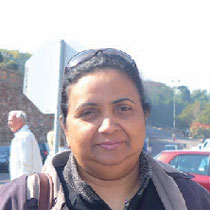 |
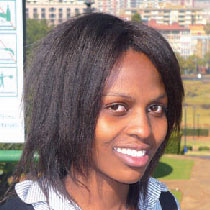 |
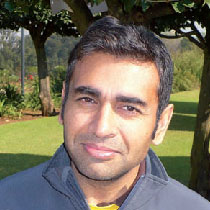 |
|
Susamma Mathews, Canada "There has been a lot of bad press about the vuvuzela, but I think it's great and proudly South African and the fans just love it." |
Rosetter Moyo, Nigeria "South Africa has not only met the expectations of the world, it has exceeded the expectations. The matches and facilities are flawless." |
Nach Dave, New York City "The vibe and the people in South Africa - they are so warm and friendly. I will definitely come to visit this beautiful land again." |
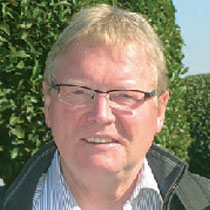 |
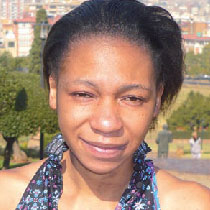 |
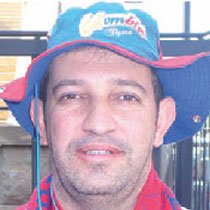 |
|
Hermann Korfmacher, Germany "I am enjoying the experience of the different cultures and flavours South Africa has to offer. The weather and the cities are so beautiful and the people are so friendly. I love South Africa" |
Agnes Kaisi, Ghana "Aside from my team, I'm also supporting Bafana Bafana. It's so nice to be welcomed and greeted with friendly smiling faces wherever I go. I love South Africa!" |
Fancisco Javier Megia, Columbia "I am surprised at what South Africa has to offer. We've heard negative stories on TV about South Africa, but after experiencing South Africa with my own eyes, I see what beautiful people live in this country." |
 |
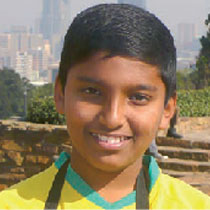 |
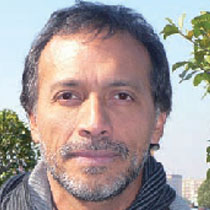 |
|
Kimo Zhu Ke Man, China "This is my first time in South Africa, I love the weather and the scenery - it is breathtaking. The people and the food are very nice and I support Argentina and Bafana Bafana!" |
Aby Zakheriah, India "I am supporting Germany and Bafana Bafana. I love South Africa and I love the vuvuzela, it is such fun." |
Alistair Rae,Philadelphia, USA "South African people are just like the weather - warm and inviting. I have been to a few matches and experienced no problems, the park-and-ride facilities were very safe and easy to use. Well done South Africa!" |
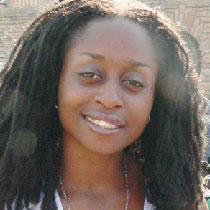 |
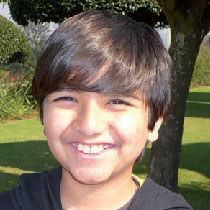 |
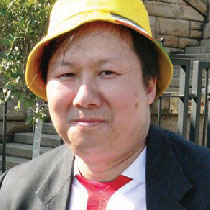 |
|
Jessica Doh, Cameroon "This is a beautiful country and Pretoria is a very well constructed town. The public transport system has come a long way." |
Kishan Dave, New York City "I love the vuvuzela and I have learnt to blow it. It's fun cheering on my favourite team at a match with the vuvuzela!" |
Roland Chen, Hong Kong "The society in South Africa amazes me; it is so peaceful and everyone is so friendly and helpful. If I didn't have to go back home I would like to live here." |
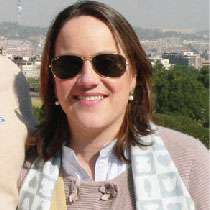 |
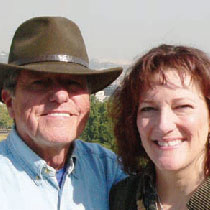 |
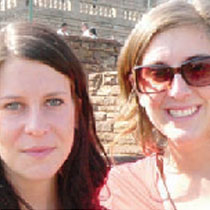 |
|
Blanca Escuin, Spain "This is our first visit to South Africa, but we hope to come back again. The vuvuzela is something we will remember. It is great during matches, but a little hard to bear all the time." |
Rick and Geneva Arnold, Nevada, USA "It has been an adventure. The people are very friendly and incredibly helpful and everybody seems to be in a good mood. The transport system is so well organised. We don't have anything like this back home. We are also very impressed with the level of security." |
Frida Ol-Mars and Viktoria Henningsson, Sweden "We have been welcomed with arms wide open by the locals. It has been such a cool experience. We love the people - they are so happy, dancing and singing together all the time." |
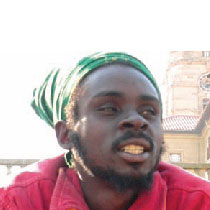 |
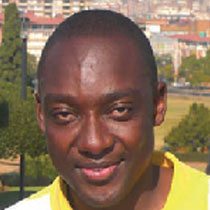 |
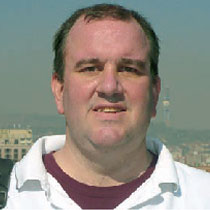 |
|
Tondera Chenjera, Zimbabwe "It is wonderful to see so many people of different races and nationalities in South Africa. These are some of the best moments I have ever experienced - the whole world coming together in Africa to celebrate." |
Enock Moyo, Nigeria "South Africa has done us proud. It's amazing to see people from all over the world unite. Well done South Africa, you have pulled off a successful World Cup!" |
Fernando Sanchez, Mexico "I am loving every minute of being in South Africa. My favourite sight so far has been the Soccer City Stadium in Soweto - it is breathtakingly beautiful!" |
- Compiled by Samona Murugan
CARING FOR YOUR PETS A BETTER LIFE FOR ANIMALS
CARING FOR YOUR PETS A BETTER LIFE FOR ANIMALS sadmin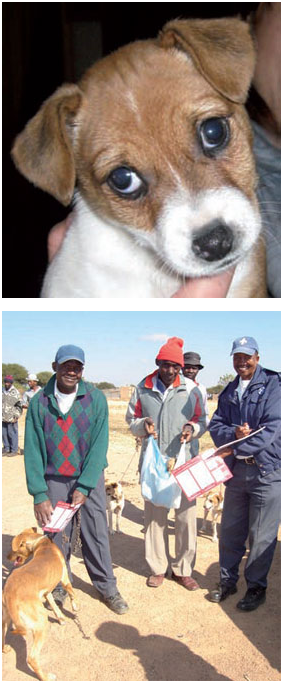 The Society for the Prevention of Cruelty to Animals is known as the SPCA. The Tshwane SPCA started a project called the Better Life Campaign to show people who have no access to animal clinics how to care, love and look after their pets.
The Society for the Prevention of Cruelty to Animals is known as the SPCA. The Tshwane SPCA started a project called the Better Life Campaign to show people who have no access to animal clinics how to care, love and look after their pets.
The SPCA is responsible for protecting and caring for abandoned animals, preventing cruelty to animals and spreading awareness of animal care.
In many rural communities where people do not have access to animal clinics, there is a problem of over-population of pets, stray animals, abuse and disease.
Communities
The Better Life Campaign, carried out by the Tshwane branch of the SPCA is a huge success in rural communities.
In many of the communities, the animals, especially dogs had become dangerous and aggressive. This is found in communities that do not have access to animal clinics, and do not know how to take proper care of their animals. The campaign also tackles problems of over-population of pets in rural communities.
The programme focuses on the health and welfare of animals, as petwell as the education and protection of the community. It promotes sterilization and prevention of diseases through, vaccination and parasite control.
Sterilize
As part of the campaign, the Tshwane SPCA officials visited many rural areas. They found that most owners could not afford proper food or health care for their pets and that most of the animals were not sterilized.
Thanks to the campaign, animals were sterilized, food was provided pet owners learned how to care for, bath and feed their animals.
Mobile clinic
The SPCA's mobile clinic treated more than a 1 000 animals during the campaign. In some areas where there were too many dogs and no one to look after them, the SPCA took them in.
The Tshwane SPCA also started a Pitbull Pals Club to encourage children to become involved in dog care and training. The club has since been opened to all breeds of dogs.
Farm animals
In communities where farm animals and livestock were being kept, the SPCA officials taught animal owners how to care for these animals and the importance of keeping them healthy and free of disease.
Donkey owners were taught how to harness their animals to prevent them from being injured while working.
- Samona Murugan
How to care for your pet
-
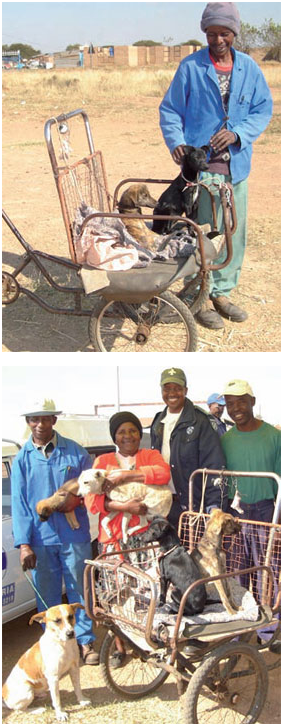 Make sure your pets get enough water, food and exercise.
Make sure your pets get enough water, food and exercise. - Treat your animals with kindness and affection; they deserve proper treatment.
- Never be cruel to animals like hitting them or tying them up with ropes or chains; they can get violent if they are abused.
- If there are animals in your community that have become dangerous, do not kill them, call your nearest SPCA for help.
For more information on the Better Life Campaign, or to report abandoned or injured animals, call one of the following numbers:
- Tshwane SPCA on 012 803 5219,
- Centurion SPCA on 012 664 5644/5
- Kungwini SPCA on 013 932 2020
You can also call a branch of the SPCA in your area, or call 1020.
CARTOON STRIP BUSINESS OPPORTUNITIES TOURISM
CARTOON STRIP BUSINESS OPPORTUNITIES TOURISM sadmin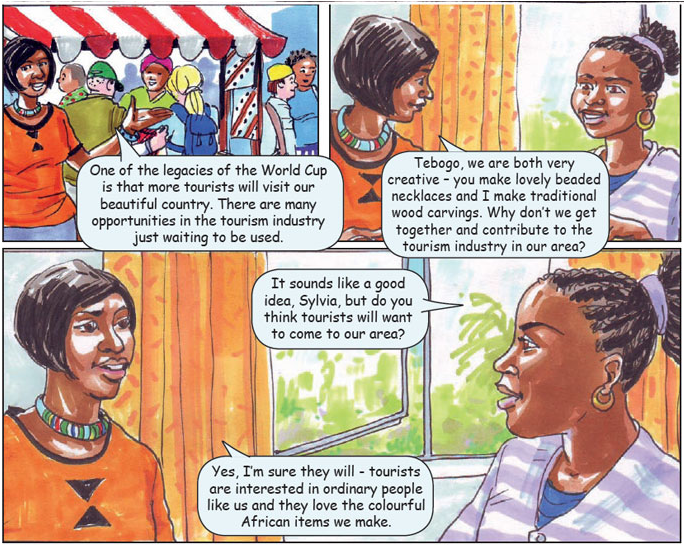
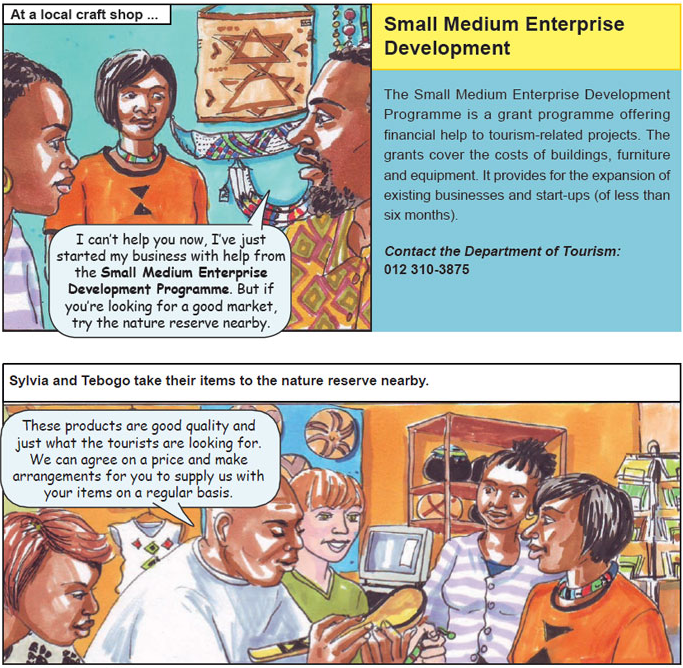
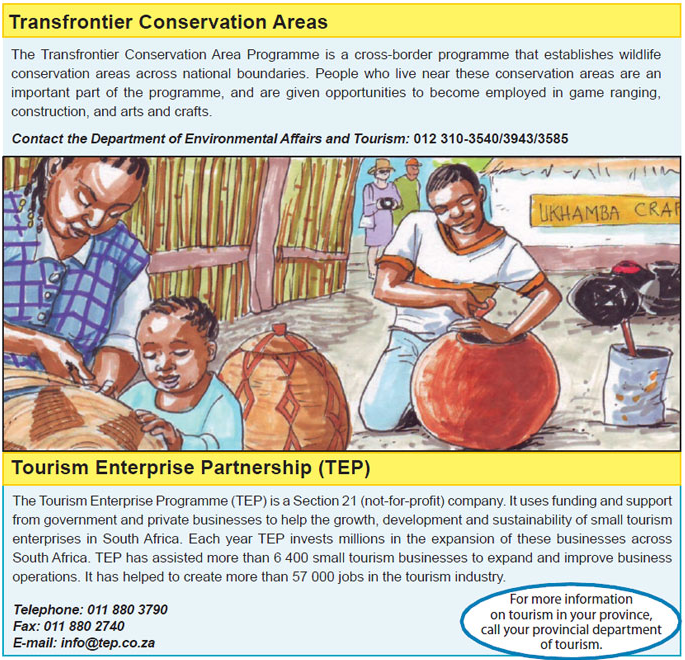
CREATING JOBS FIGHTING FIRES, FIGHTING POVERTY
CREATING JOBS FIGHTING FIRES, FIGHTING POVERTY sadmin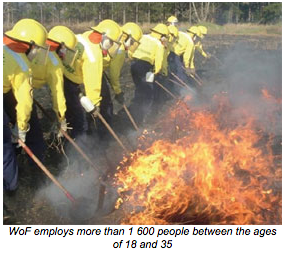 Working on Fire is one of government's most successful job creation and skills development programmes. It helps to fight poverty by giving jobs and skills to unemployed men and women from rural areas.
Working on Fire is one of government's most successful job creation and skills development programmes. It helps to fight poverty by giving jobs and skills to unemployed men and women from rural areas.
Working on Fire (WoF) was started as part of the Expanded Public Works Programme (EPWP) to create jobs. It is supported by the Department of Water Affairs, the Department of Agriculture, Forestry and Fisheries, and the Department of Co-operative Governance and Traditional Affairs, as well as private sector partners.
Skills
The programme is carried out by the Forest Fire Association (FFA), which was started by the South Africa Forestry industry to fight wild fires in South African plantations. Wild fires are any uncontrolled fires that start in the countryside, in the wilderness or in protected natural areas.
More than half of the people who are trained in fire fighting have never had jobs or training before. Many have not completed secondary school and are the sole income earners in their households.
WoF employs more than 1 600 people between the ages of 18 and 35. Those who have successfully completed the programme are employed by local authorities, local governments or private companies.
Training
Training involves standard firefighting procedures, safety rules, attack methods and how to use firefighting tools and equipment, like pumps and hoses. Trainees also get fitness training. This is important to help them cope with the demands of the job, which include long hours of fighting fires in mountains, forestry plantations, and grasslands throughout the country.
There are daily physical training sessions and job-related lectures on first-aid and fire behaviour, as well as life-skills courses on topics like HIV and AIDS awareness.
Teams are also taught to look out for themselves and for each other, and that safety procedures are extremely important.
Prevention
Once trained, the fire fighters are placed in teams of between 10 and 25 people at 74 bases throughout the country. The firefighters help partner organisations, such as SANparks, CapeNature, and local municipalities to fight wild fires in their areas.
Apart from fire fighting, members of the programme also spread prevention message in communities. They visit schools and attend community gatherings to teach people how to manage wild fires.
International
WoF also co-operates with firefighting agencies in Australia, New Zealand, and Europe. They share knowledge and develop fire-fighting techniques.
Working on Fire International, also has partner agencies in Zambia and supports wild-fire fighting initiatives throughout the African continent.
- Samona Murugan
For more information on WoF, call 021 797-5787 or visit www.workingonfire.org
FOCUS ON THE PROVINCES EASTERN CAPE
FOCUS ON THE PROVINCES EASTERN CAPE sadmin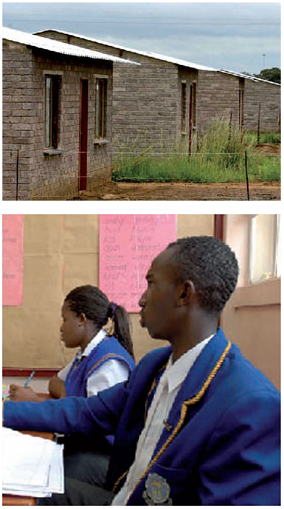 Affordable housing for all
Affordable housing for all
Government is going all out to assist people to obtain affordable and habitable shelter. President Jacob Zuma emphasised this commitment at the launch of a social housing programme in East London.
Through the Emerald Sky project, government aims to provide affordable housing to people in need. The project consists of 656 units.
Close to R15 billion will be spent this year on housing, with homes being built in more than 8 000 human settlement projects throughout the country. Many of the 2 700 informal settlements alongside almost every urban and peri-urban town is also being upgraded to improve the bad conditions of those living there, President Zuma said.
Government has built over 2,7 million homes for South Africans since 1994, giving shelter to more than 13 million people.
NO more Illegal initiation
The Eastern Cape Health Department will shut down illegal initiation schools in the province to ensure that further lives are not lost during unsuccessful circumcisions. Owners of illegal schools will be arrested. They will then face jail terms of up to 15 years or a fine.
The department has also issued policy guidelines on starting initiation schools. The schools must get permission from the local traditional leader, as well as from the department. The department has urged parents to make sure a school is legal before sending their children there.
FREE STATE
Mobile clinics increase access to healthcare
To ensure that more matric learners in the province pass subjects like Maths and Science, the Free State Department of Education used the recent school holidays to present an enrichment programmes. It is aimed at problematic learning areas in Mathematics, Science, Technology and Accounting (MSTA).
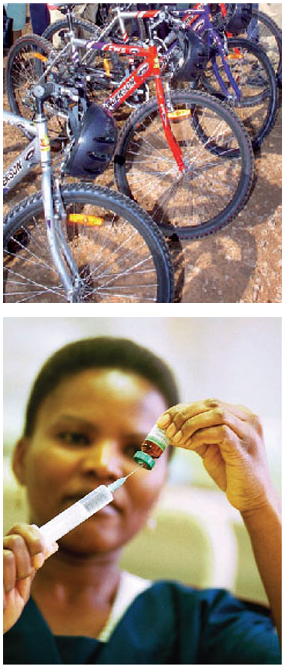 The MSTA programme is aimed at learners who have never taken part in such skills-development initiatives and to encourage them to further study the subjects after they leave school. 168 learners were chosen from ten rural towns in three districts. The programme is a partnership between the department and the University of the Free State. It forms part of other ongoing programmes that have been initiated by the department to support teaching and learning areas in the province's schools.
The MSTA programme is aimed at learners who have never taken part in such skills-development initiatives and to encourage them to further study the subjects after they leave school. 168 learners were chosen from ten rural towns in three districts. The programme is a partnership between the department and the University of the Free State. It forms part of other ongoing programmes that have been initiated by the department to support teaching and learning areas in the province's schools.
KWAZULU-NATAL
Cycling to school
One hundred learners from disadvantaged backgrounds in KwaZulu-Natal have received brand new bicycles from the National Youth Development Agency (NYDA). The initiative is part of the 'Ride to School Bicycle Project', which aims to help learners who have to walk long distances to schools on a daily basis.
Most of the learners who were chosen from 16 schools around Jozini had to walk about six kilometres to and from school every day. The project supports the Integrated Rural Mobility and Access (IRMA) project of the Department of Transport. It aims to develop rural transport to improve mobility and access to social and economic activities in rural areas. This project improves youth development with a special focus on young women, while also improving access to education.
MPUMALANGA
Mobile clinics increase access to healthcare
A total of 18 new mobile clinics will be launched in Mpumalanga to improve access to healthcare in rural villages and farming areas that have no clinic facilities nearby. These mobile clinics will make a difference in the lives of many rural and farming communities who are underserved because of the shortage of mobile clinics.
Mbombela local municipality, with Nelspruit as its headquarters, will receive five of the mobile clinics. Umjindi local municipality (Barberton) will get one new mobile clinic to cover farms in the area. Nkomazi local municipality (Komatipoort) will get five mobile clinics to service Tsambokhulu, Goba, Mangweni, Mandulo and Khombaso villages.
Thaba Chweu local municipality (Mashishing) will get three mobile clinics to service Sabie and surrounding areas. The Bushbuckridge local municipality with its numerous villages, many of which are isolated, will get four new mobile clinics.
NORTH WEST
TB CAN be cured
Tuberculosis (TB) is a curable disease. But despite this fact the province has seen many deaths as a result of TB. This is because many TB patients do not complete their treatment, which can lead to severe forms of TB or death. Some 30 000 patients in the province who are receiving tuberculosis (TB) treatment have therefore been urged to complete their treatment as prescribed.
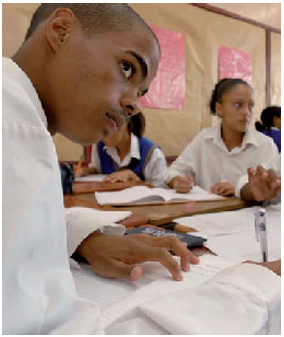 There are many types of TB, including Multi-Drug Resistant (MDR) TB and Extreme Drug Resistant (XDR) TB, which developed as a result of TB that was not managed properly. Treating these types of TB is very expensive. To help control the cost of fighting TB and reduce the high death rate from TB, the province has improved the management of the disease. All its health facilities are now able to provide TB treatment. New MDR TB and XDR TB units were launched at the Klerksdorp hospital and a new MDR TB unit at the Greater Taung Hospital.
There are many types of TB, including Multi-Drug Resistant (MDR) TB and Extreme Drug Resistant (XDR) TB, which developed as a result of TB that was not managed properly. Treating these types of TB is very expensive. To help control the cost of fighting TB and reduce the high death rate from TB, the province has improved the management of the disease. All its health facilities are now able to provide TB treatment. New MDR TB and XDR TB units were launched at the Klerksdorp hospital and a new MDR TB unit at the Greater Taung Hospital.
GAUTENG
Extra help for learners
The Gauteng Department of Education started a programme of holiday classes in 276 high schools which performed poorly in their last exams. The programme, which is aimed at Grades 10 to 11, helps learners with extra lessons in mathematics, science and accountancy. Parents are urged to encourage their children to participate in these extra classes as they are crucial to passing matric.
The programme has been running since April and will continue until the September holidays, as well as every Saturday. The aim of the programme is to improve matric pass rates at the end of the year. The Department of Education aims to continue these holiday classes every year.
- Information sourced from: BuaNews and provincial websites.
For more information, call 1020 or visit your province's website.
FUN PAGE PLANT A TREE THIS ARBOR WEEK
FUN PAGE PLANT A TREE THIS ARBOR WEEK sadminPLEASE NOTE:
The games on this page are not competitions. They are only for fun, so don't send your answers to Vuk'uzenzele.
In South Africa, Arbor Week is celebrated from 1 to 7 September every year. This is a time when people are encouraged to plant trees, especially indigenous trees, and to learn about the importance of trees.
During Arbor week, schools, businesses, organisations and communities are encouraged to participate in community "greening" projects to improve the health and beauty of the local environment and help build a "greener" future for South Africa.
Why are trees important?
Trees give food, shelter and shade to people and animals. Trees also give wood for furniture and building. In addition, they give beauty, help to prevent loss of soil and filter pollution from the air.
What are 'indigenous' trees?
'Indigenous' trees grow naturally in a country. 'Exotic' trees are imported into a country from another country.
What does 'arbor' mean?
The word "arbor" (also spelled arbour) means tree or "a shady place in a garden made with trees".
DID YOU KNOW?
The first Arbor Day was celebrated in the United States of America in 1872. In South Africa, Arbor Day was first celebrated in 1983. It was later extended from a day to a whole week.
Unscramble the Words
Print the image below to complete this game...
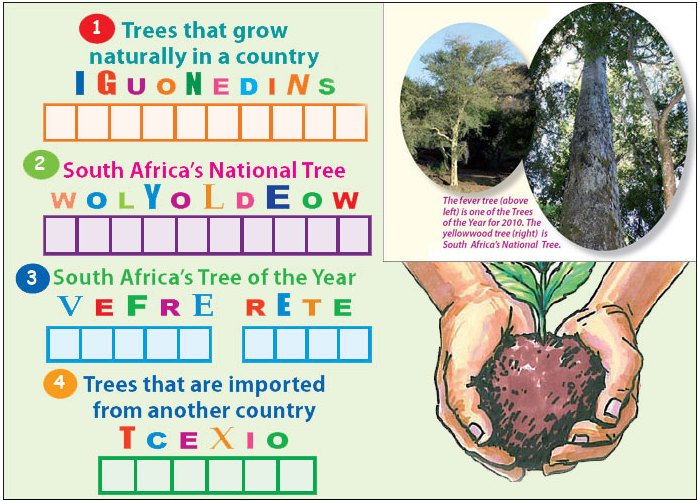
Fill in the Missing Words
Complete the sentences by filling in the missing words.
Print the image below to complete this game...
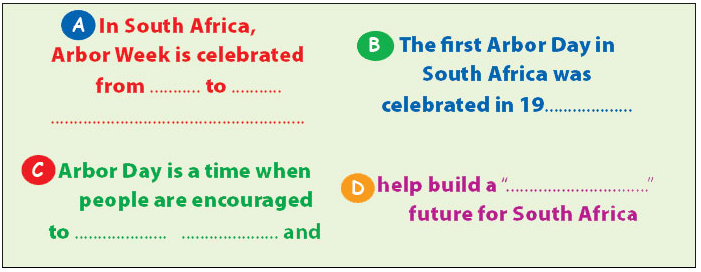
HEALTH PREVENT INFLUENZA - VACCINATE
HEALTH PREVENT INFLUENZA - VACCINATE sadmin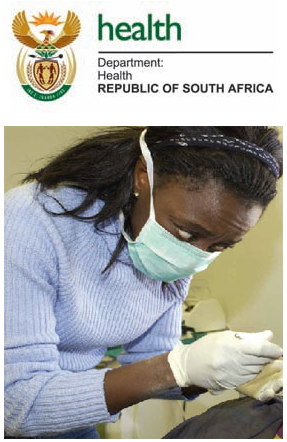 Are you at high risk of becoming seriously ill?
Are you at high risk of becoming seriously ill?
If you fall into the high-risk group of people who can get H1N1 influenza, the Department of Health has a vaccine to protect you. Not everyone needs to be vaccinated against the H1N1 virus, but it is important for those who are at risk.
Who falls into the high risk groups?
- pregnant women
- children under 15 years who have HIV and Aids
- people over 15 years who have HIV and Aids and are attending anti-retroviral (ARV) clinics
- patients with chronic heart and lung diseases, diabetics and patients with chronic heart and lung diseases
- healthcare workers.
Who should NOT be vaccinated?
Babies under the age of six months should NOT be vaccinated, as well as people who have:
- a history of severe allergic reactions or other lifethreatening allergic reactions to chicken eggs or any of the ingredients or trace ingredients of the vaccine
- a history of a severe reaction to previous flu vaccination
- developed Guillain-Barré syndrome (GBS) within six weeks of having a flu vaccine
- a moderate to severe illness with a fever (wait until you recover to be vaccinated).
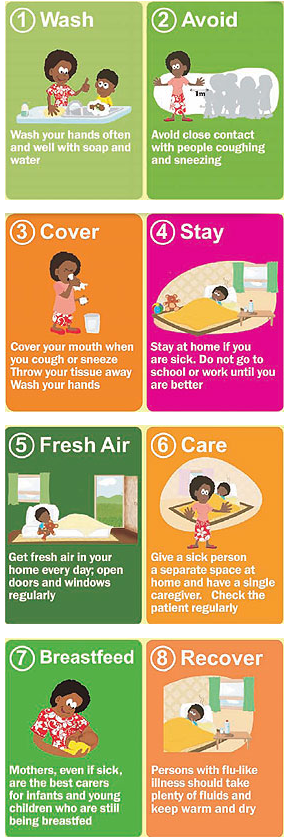 Is the vaccine safe and will it protect me from other flu viruses?
Is the vaccine safe and will it protect me from other flu viruses?
Yes. Studies so far show that the new vaccines are just as safe as the previous seasonal flu vaccines and offer protection against other influenza viruses.
Can I take the new flu vaccine at the same time as other vaccines?
You can take the inactivated H1N1 vaccine at the same time as other injectable, non-influenza vaccines (like vaccine for measles), but it should be given on different parts of your body (e.g. one on the left and the other on the right arm).
Is it safe to be vaccinated while I am pregnant?
The vaccine is not harmful in pregnancy and won't affect fertility, the development of a baby, birthing or baby's development after birth. Because of the high risk to pregnant women, the benefits of vaccination far outweigh the risks of getting ill with H1N1 flu.
What are the signs of H1N1 flu?
Mild symptoms of H1N1 flu include:
- a runny or blocked nose
- fever
- muscle aches and pain
- coughing.
Moderate symptoms include:
- shortness of breath
- chest pains
- persistent vomiting and diarrhoea.
Severe symptoms include:
- difficulty in breathing
- blue lips
- severe drowsiness or loss of consciousness
Precautions
Even if you have been vaccinated, you must still take precautions against H1N1 influenza and spreading the virus:
- Cover your mouth when you cough or sneeze
- Throw your tissue away safely
- Wash your hands well and often with soap and water
- Avoid close contact with people who have flu
- Stay at home if you are ill.
- Go to a doctor if you have any of the symptoms
The vaccine is free of charge at government clinics to anyone who is considered to be in the high risk groups. (Private doctors and hospitals will charge a fee).
Protect yourself against colds and flu
As the winter nights get colder, out come the jerseys, blankets, heaters and tissues. During the cold winter months, flu and colds spread from one person to another at home and at work. You can protect yourself by boosting your immune system and staying warm.
Influenza, also known as the flu, is a contagious respiratory illness caused by influenza viruses. Colds and flu are spread from person to person through coughing and sneezing and is highly contagious.
Colds and flu are both caused by viruses and have similar symptoms. However, flu can last up to two weeks and is much more serious than a cold, which lasts about three to seven days. The signs include a runny nose, sore throat, headaches, tiredness, fever, coughing and body aches and pains. It can also include symptoms like nausea, vomiting and diarrhoea.
If it is not treated immediately, it could get worse and lead to pneumonia. This is common with high-risk patients like the elderly, people with diabetes, asthma, bronchitis and other immune-related illnesses.
If your flu gets worse, your fever suddenly rises and you have difficulty breathing, you may have pneumonia.
Prevention
The best way to prevent colds and flu is to boost your immune system by eating nutritional food, especially lots of fruits and vegetables, which are rich in vitamins. You can also get a seasonal flu vaccination each year from your local clinic.
For further information call the H1N1 Hotline at 0861 364 232, visit a clinic or a healthcare professional, send an e-mail to H1N1@health.gov.za, or go to the National Department of Health's website at www.doh.gov.za
KEEPING IT BRIEF
KEEPING IT BRIEF sadminMPUMALANGA
Nelspruit's Mbombela stadium has hosted some of the World Cup's most exciting clashes, while bringing the excitement of the tournament to the people of Mpumalanga. "The tournament has placed Nelspruit on the map," said Differ Mogale, Nelspruit's 2010 co-ordinator. "People are still excited. We did well during the tournament and this experience will help us to be the best city for our people and citizens in future."
EASTERN CAPE
Despite Nelson Mandela Bay being one of the smaller host cities, the city's FIFA Fan Fest attracted the third most visitors during the first two weeks of the World Cup. Attendance peaked at 29 000 on the opening day with the lowest daily total around 2 500. Of the 10 official sites countrywide - one for each host city - only those in Durban and Cape Town had outperformed the one in Nelson Mandela Bay. The parks in Sandton and Soweto ranked fourth and fifth respectively.
NORTHERN CAPE
A total of 67 nurses graduated at the Henrietta Stockdale Nursing College in Kimberley at the end of June. They are already doing community service in the province to address the shortage of nursing personnel. The increase in the number of qualified health professionals will improve the quality and accessibility of healthcare, especially in the underserved, rural areas of the province.
FREE STATE
To highlight the history and importance of football in the province, the National Museum in Bloemfontein put up an exhibition displaying various objects that capture soccer history. It includes old trophies, soccer kit, old soccer boots, teams' soccer blazers, photographs, soccer balls, books and newspaper clippings. The exhibition has been very popular with fans during the World Cup and is still attracting many visitors.
LIMPOPO
Police in the province will continue to maintain their high visibility, even after the World Cup, said Deputy Provincial Commissioner, Major General Benny Ntlemeza. The Limpopo police are proud to have delivered a safe and secure 2010 FIFA World Cup in the province. "Our members were ready to handle any situation and we had 150 officers on stand-by during the World Cup games," said Ntlemeza. "We instilled a sense of responsibility in every person involved."
KWAZULU-NATAL
More than 20 000 prisoners in the province will receive HIV counselling and testing. A joint initiative between the province's departments of health and correctional services will see half of correctional services staff also given access to testing and counselling. The HIV Counselling and Testing (HCT) programme will include access to wellness centres for both staff and prisoners. Correctional Services has six accredited antiretroviral sites in the province.
- Information sourced from BuaNews and provincial government websites
For more information, call 1020
LETTERS TO THE EDITOR GIVE US A PIECE OF YOUR MIND
LETTERS TO THE EDITOR GIVE US A PIECE OF YOUR MIND sadmin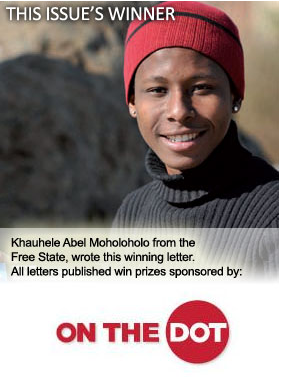 WINNING LETTER
WINNING LETTER
Regardless of disabilities, we are the future
I am 22 years old and have been disabled since 1997 when I was only nine years old. A minibus taxi hit me and I can't walk properly. But I have learned to accept my situation and to move forward with my life. I have achieved a lot regardless of my disability. I may not be able to run the 100m in 10 seconds, but because I'm very dedicated and motivated, I achieve my goals and excell in my studies.
Hey, fellow South Africans, being disabled does not mean that you are worthless; you can be the best and have equal chances to discover everything that life has to offer. I urge every disabled Mzansi citizen to show the world that although we are physically different, we can contribute significantly to the welfare of this country. Hey, my fellow disabled brothers and sisters, let us follow in the footsteps of all the great South African leaders and strive to be better people. We, the youth are the future of South AfrIca regardless of our disabilities!
- Khauhele Abel Moholoholo, Welkom, Free State
We are still winners!
Gone are the days when race used to determine which social group you fall under. Now is our time to shine and all stand together as one, as proudly South Africans full of ubuntu. We are celebrating the success of the first World Cup to be hosted in Africa. This event will always be treasured and remembered. Although we didn't win the World Cup, we are still winners.
All we can do is to continue supporting our Bafana team all the way. But it is more important to stand and stay together even after the World Cup.
- Pheladi Molepo, Soshanguve, Gauteng
Make our country the best
I understand that we are free and have the right to say and do what we want in our country, but we cannot undermine our society. I have seen many instances where people have tried to solve their problems of underpayment and other complaints by burning property like Metro Rail and municipal premises. This is not the way to do things; by doing so we are destroying our democracy. Let us stop violence and cruelty beloved Africans and make our country the best country in the world. Let us change our bad thinking to smart developing.
- Harrison Saba, Mthatha, Eastern Cape
"What can I do to help?"
South Africa is alive with possibilities and we need to make use of every opportunity we get, no matter how small it is. Government cannot always provide everything, so let us at least try to meet government halfway. Instead of complaining and lamenting about government not providing the necessary infrastructure for the development of the country, why don't we rather ask: "What can I do to help? How can I contribute to my country?"
- Nozi Mcingana, Zastron, Free State
It has to stop!
This has to stop! It's enough, what we as South Africans are doing is unfair, uncalled for and absurd. Why the need for all the strikes and problems. Let's stand united in our democracy and invite visitors to our beautiful country. Instead of fighting among each other about what the President did or didn't do, let's stand together hand-in-hand, let's fix the problems and not create more.
- Rashida Canthitoo, Chatsworth, KwaZulu-Natal
Be open and think wisely
It's hurting and embarrassing the way we, the youth of this country take education so lightly or as if we go to school for the benefit of our parents. No, guys, that is totally wrong. Our government is trying harder and harder to provide us with free education. We must be open and think wisely. I have a wish that we, the youth of this beautiful country could have the same vision and tell ourselves that we will defy every obstacle in our way. Let's stand up and learn to avoid the painful outcomes of not going to school.
- Jan Matjeke, Polokwane, Limpopo
Thank you Vuk...
I want to thank Vuk'uzenzele for always updating us with your free magazines by giving us tips, warnings and encouragements. Keep up the good work. Thank you also for allowing readers to send their views. We love you and we wish you good luck in whatever good work you do. Your work is inspiring individuals and is going to change the entire country. Even your "Greetings' are informative and helpful.
- Sindiswa Msutu, Butterworth, Eastern Cape
.. You inspire me
Thank you Vuk'uzenzele for the good work you are doing and for allowing readers to write about good or bad experiences. Thanks also for lots of advice on life in general. Every time after reading Vuk'uzenzele and all the motivational letters, I feel very inspired and want to do something with my life. And lastly, thank you for all the information about a world-class event - the 2010 FIFA World Cup. Guess what, I even learned the diski dance. Keep up the good work and believe me, you are helping many people out there.
- Elias Mokati, Marquard, Free State
Grow your own garden
South Africans, please grow a small vegetable garden, it saves money and helps you eat more healthy. Plant a mix of your favourite vegetables and take care of them by watering them and killing weeds and insects around them. Spend one hour in the morning before breakfast and one hour in the evening before supper. I am talking from experience. Since last winter I never went shopping for isishebo and I'm using the money I saved to buy 'food stamps'.
- Ntomboxolo Priscilla Mzobe, Highflats, KwaZulu-Natal
A lame excuse for crime
We often hear that people who commit crime do so because they are unemployed. While I am aware of the high rate of unemployment in South Africa, I think this is a very lame excuse to do crime. People do not turn to crime because they are poor. Think how insulting that statement is to all of us who struggle to make ends meet every month without resorting to crime.
The majority of people driving around in flashy cars and living in expensive homes weren't born wealthy. They've worked hard for every cent. And if they can do it, so can I. You can get a good education by either working hard to get a bursary or putting yourself through school doing odd jobs. Through hard work, all of us can make a life for ourselves.
- Phillistus Phetla, Gauteng
WRITE TO:
Vuk'uzenzele, Private Bag X745, Pretoria, 0001, or e-mail: vukuzenzele@gcis.gov.za.
If you don't want to have your real name published, you may use a different name, but you must include your real name and address to us.
PLEASE NOTE:
To win a prize, you must include a physical address and a contact telephone number in letters to us.
All letters will get a response.
Role model - Her positive attitude beat disability
Role model - Her positive attitude beat disability sadmin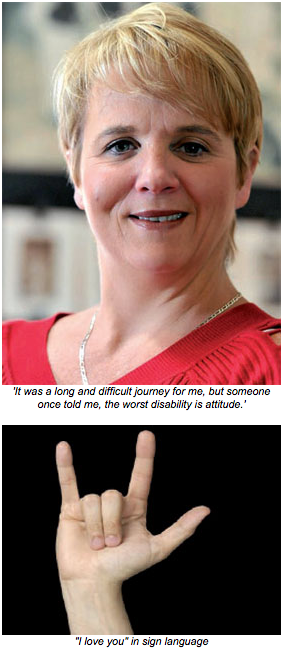 Ingrid Parkin is the first Deaf principal in South Africa. Despite her disability, Ingrid has stayed positive and focused. She says the key to achieving your goals is believing in yourself!
Ingrid Parkin is the first Deaf principal in South Africa. Despite her disability, Ingrid has stayed positive and focused. She says the key to achieving your goals is believing in yourself!
At the age of seven, Ingrid was involved in a car crash. She was in a coma for two weeks and when she woke up, she could not hear a sound. "I went to sleep and woke up deaf!" She then realised that things would never be the same again.
"At first, I was angry and could not understand why this happened to me," says Ingrid. But she realised there was nothing she could do to change the fact that she was deaf, but she could change her attitude about her disability.
Make the best
From that moment, she knew she had to make the best of her situation. "It was only once I accepted my disability, that I truly started the road to recovery."
Her parents enrolled her at the St Vincent School for the Deaf in Johannesburg. She progressed to high school at the Fulton School for the Deaf in Durban. Surrounded by other people like her, finally made Ingrid feel she belonged.
University
"I set goals for myself and did whatever I could to achieve them," she says. She dreamed of becoming a teacher, but a college in Johannesburg turned her down, saying that Deaf people could not teach.
Determined not to give up, Ingrid enrolled for a degree in Education at the University of the Witwatersrand. With the support and encouragement of her lecturers and sign language interpreters, she got her Bachelor's degree in Education, followed by an Honours degree in Deaf Education.
Degree
She then joined the staff of her high school in Durban where she taught for 10 years, before being appointed deputy principal. Following this, Ingrid became a director at the Deaf Federation of South Africa.
A few years later she made history by becoming the first Deaf principal in the country. "It was a great feeling and I am still so honoured."
Support
Ingrid says she has achieved her goal with the encouragement and support of her family and her husband, Deaf Olympic swimmer, Terence Parkin.
She says sometimes you feel unworthy, but your attitude determines your future. "Believe in yourself, work hard and you will achieve your goals."
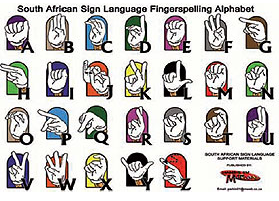 - Samona Murugan
- Samona Murugan
Sign language is used by people who are deaf or have hearing disabilities. They use different hand signs to communicate with other people. Some deaf people also lip-read by focusing on the movement of people's lips when they talk.
SCHOOL NUTRITION PROGRAMME HEALTHY BODIES, HEALTHY MINDS
SCHOOL NUTRITION PROGRAMME HEALTHY BODIES, HEALTHY MINDS sadmin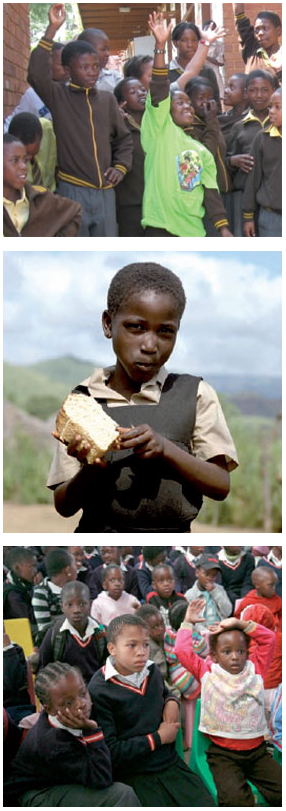 A hungry child cannot concentrate and perform well in class. A healthy mind and body requires nutritional food. The School Nutrition Programme, started by the Department of Education 16 years ago, has become a huge success. It has improved learner concentration levels, making them more alert. The department encourages all schools in disadvantaged communities to start their own nutrition programmes.
A hungry child cannot concentrate and perform well in class. A healthy mind and body requires nutritional food. The School Nutrition Programme, started by the Department of Education 16 years ago, has become a huge success. It has improved learner concentration levels, making them more alert. The department encourages all schools in disadvantaged communities to start their own nutrition programmes.
Each province runs its own nutrition programme, while the National Department of Education is responsible for the management of the programme.
The programme helps schools to start their own food and vegetable gardens. This enables schools to grow and use their own fresh vegetables and herbs for their meals.
Wherever the programme has been implemented, hunger has been combated and the overall school attendance has improved.
Food gardens
plant, harvest and clean the ingredients to prepare nutritious meals for learners. More than 7 194 396 learners in 20 943 primary and secondary schools throughout the country are benefiting from this programme.
Schools can now improve and check the quality of all meals. Since the start of the programme, schools have noticed the difference and change in learners' attitudes, performance, attendance and grades have improved.
Thanks to the programme, schools have been able to buy things like kitchen appliances, garden tools and seeds with the help from parents, community members, other government departments, businesses and non-governmental organisations.
Success
Some schools have achieved great success despite many challenges. To encourage more schools to start the programme, the Department of Education rewarded some schools with cash prizes.
They looked at things like:
- presenting and creating nutritious and healthy meals
- ensuring learners were fed under supervision
- record-keeping, staff involvement, participation of interested parties
- starting and promoting food gardens
- ensuring clean preparation of food.
The winning schools
Maxonia Primary school in the Western Cape: managed to encourage partnerships with businesses in the community who sponsor supplies when funds are not available. With help from the community, the school could build a new kitchen, which has improved the preparation of meals.
Mogobeng Primary School in Gauteng: they started a green house at the school so learners could eat vegetables throughout the year. The school went the extra mile and employed a full-time dietician who is responsible for improving the meals. They also received a donation to build a dining hall for learners from private company, Langenberg.
Moholeng Primary School in the Northern Cape: they implemented the project with limited resources. The school has managed to maintain a food garden and avoids food wastage by storing excess vegetables.
- Samona Murugan
Since the School Nutrition Programme started, it has grown and improved a great deal. New kitchens have been built, dieticians and health staff have been employed, feeding days have been extended and many schools have tripled the number of children they feed. The department recently visited schools carrying out the programme to see if it is working. The results showed that many schools are now offering hot meals. This has improved learner concentration levels and alertness in class. For more information, call 012 357-3419 or 012 357-3421
WOMEN'S MONTH CELEBRATING SOUTH AFRICAN WOMEN
WOMEN'S MONTH CELEBRATING SOUTH AFRICAN WOMEN sadmin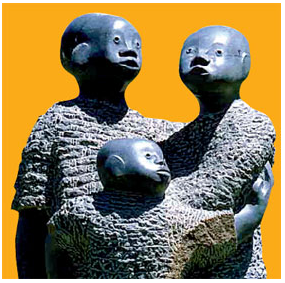 In South Africa, 9 August is Women's Day and the month of August is National Women's Month. This is an opportunity to celebrate women's achievements and the important role that women of all races and religions have played and continue to play in South African society.
In South Africa, 9 August is Women's Day and the month of August is National Women's Month. This is an opportunity to celebrate women's achievements and the important role that women of all races and religions have played and continue to play in South African society.
On 9 August 1956, more than 20 000 women from all walks of life united in a mass demonstration to the Union Buildings in Pretoria. They protested against the unjust pass laws enforced on women in South Africa.
The women were led by Lilian Ngoyi - a trade unionist and political activist, Helen Joseph, Albertina Sisulu, and Sophia Williams-De Bruyn.
Important role
In remembrance of what South African women achieved on that day, 9 August has been declared as National Women's Day and is a public holiday in South Africa. Women's month is an opportunity to celebrate and reflect on women's achievements, as well as the problems they have faced in the struggle to be free and the important role they continue to play in society. Apart from their traditional roles as mothers, wives and caregivers, statistics show that women are making great progress in business, politics, academic and economic careers with more and more women reaching top positions.
Entrepreneurs
Government is committed to empowering women and helping them to reach their highest potential. For example, the South African Women Entrepreneurs Network (SAWEN) is an initiative of the Department of Trade and Industry. It is a networking forum committed to advancing women in business.
Its main objective is to bring business women together to talk about the challenges they face. The network gathers and updates a database of women-owned businesses and services. It also helps with training and developing of business skills.
Make a difference
Women of South Africa, be proud of what you have achieved. Let the achievements of those who went before you inspire you to unlock your own strength and motivate you to make a difference in your family, your community or your country.
Go out and celebrate the women that you are. Go out and make a difference this Women's Month!
- Samona Murugan
Equal rights, equal opportunities, progress for all This year is the 99th anniversary of International Women's Day, which is marked on 8 March every year by many countries throughout the world. The theme for 2010 is "Equal Rights, Equal Opportunities, Progress for All. "The focus of International Women's Day ranges from showing respect, appreciation and love towards women, to celebrating women's economic, political and social achievements.
YOUTH 'BUY YOUTH' CAMPAIGN REAPS BENEFITS
YOUTH 'BUY YOUTH' CAMPAIGN REAPS BENEFITS sadmin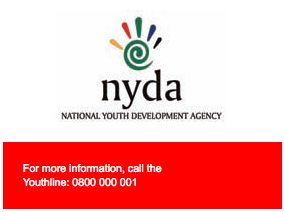 It's all systems go for a number of young people who attended the National Youth Development Agency's (NYDA) 'Buy Youth' Campaign held in different provinces since its launch last year.
It's all systems go for a number of young people who attended the National Youth Development Agency's (NYDA) 'Buy Youth' Campaign held in different provinces since its launch last year.
The NYDA started the campaign to get big companies to buy from youth-owned Small Medium Enterprises (SMEs). This is because one of the challenges they face is a lack of access to business markets. The campaign created an opportunity for both industry buyers and youth-owned SMEs to make contact and do business to the benefit of both buyers and SMEs.
Beyond expectations
Tabisa Khoapa, proud owner of Tabisa Training &Management Services, is one of 32 young entrepreneurs who benefited from the campaign. She had an opportunity to make a presentation to a group of 128 corporate companies and industry buyers in the Gauteng leg of the campaign.
This has helped Tabisa Training &Management Services, a company that provides health and safety training and management services in the construction sector, to grow beyond expectations.
Opened doors
As a result of the campaign, they have secured business opportunities with giant companies like Sasol Chemcity and Denel Land Systems. This, in turn, has also opened doors for Tabisa to develop a health and safety toolkit for the construction industry, the first of its kind. "Exposure by the NYDA got us into the fast lane and we've been running ever since, " says Tabisa. "I've got more staff and the business is expanding. Generally, we have managed to change focus and re-strategise."
- Mbulelo Baloyi
YOUTH PLEASE CALL ME..
YOUTH PLEASE CALL ME.. sadmin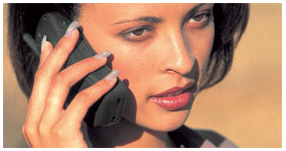 Imagine a young woman who has just been diagnosed HIV-positive and is filled with fear, or a young man from an abusive background who feels his world is falling apart and wants to commit suicide. There is help for such troubled young people - loveLife is throwing them a life-line with a new call-back service. The service is supported by the Department of Health, as well as the Department of Social Development.
Imagine a young woman who has just been diagnosed HIV-positive and is filled with fear, or a young man from an abusive background who feels his world is falling apart and wants to commit suicide. There is help for such troubled young people - loveLife is throwing them a life-line with a new call-back service. The service is supported by the Department of Health, as well as the Department of Social Development.
Over the years, many troubled young South Africans have called loveLife's toll-free Youth Line, seeking help from professional counsellors at the call centre. In addition to counselling services, young people can also get information on issues like sexual health, life skills or study opportunities.
First of its kind
Because of the high volumes of calls handled by the call centre and long waiting periods, loveLife decided to add a 'please-call-me' service to its Youth Line. This means callers who cannot be helped immediately, can just send a 'please call me' message to the line, and a counsellor will call them back.
The call-back service is the first of its kind for a call centre in South Africa. Through the service, loveLife is able to reach large numbers of young people since a huge percentage of young South Africans own mobile phones. It is part of loveLife's efforts to reach more young people, especially those in poor communities.
Free of charge
The service is free and simple to use. All you need to do is send a please-call-me message to service-specific numbers connected to the loveLife Youth Line. You will then receive a message confirming receipt of your message. Your number will be added to a queuing system and the system will phone you back so that you can chat to a counsellor.
- Mbulelo Baloyi
MTN: *121*0833231023#;
Vodacom: *140*0833231023#;
Cell C: *111*0833231023#.